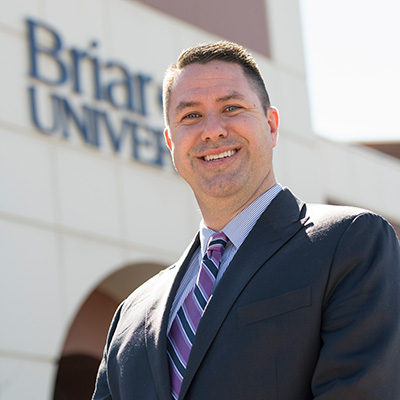
Patrick Cross
In 2013, Patrick Cross accepted the task of working with key Briar Cliff University officials to create a Doctor of Physical Therapy (DPT) program. Today, as the founding program director, he’s proud of the program's rigor and student outcomes since the program’s inception.
“I am very pleased with where we are today, but I don’t think we can just sit back and be proud of where we have come from. We must continuously evolve and tweak things, based on the ever-changing educational, professional, and community environments,” Cross said. “We have something that Briar Cliff and the Siouxland community should be proud of. Now we just need to continuously polish that thing that is very special.”
The DPT program is one of three doctoral programs at Briar Cliff, and in most years, the program oversees 90 to 96 students who are working towards an entry-level physical therapy degree that will help the students pass boards and be prepared to practice in almost any setting. Cross said he is also proud of the fulfillment of the DPT department’s mission of preparing students to serve underserved populations, including rural areas and places designated as professional shortage areas. Within their first year of graduating, BCU DPT alumni have gone into positions in rural settings more than 40 percent of the time, while one-third of them have gone and practiced in a primary health professional shortage area.
It took two years to launch the program, with students first attending classes in fall 2015. Since that time, there have been 177 DPT graduates, with the first class graduating in spring 2018, for a total of six cohorts who have fully completed the program.
As an integral component of the program, students complete clinical education experiences that provide students with the opportunity to apply the techniques and theories they learn in the classroom. Cross is pleased that feedback from the clinical instructors that the BCU students are mentored by is highly positive.
“The feedback has made us aware that many of our students may be more prepared for clinical affiliations than students from other regional DPT programs,” he said. “I believe this is because of our pro bono clinic. It builds their hands-on, patient interaction, and problem-solving skills, as well as their confidence … Our students are immersed in patient care and treatment throughout the first two years of the program.”
Cross oversees a team that includes five full-time faculty, eight adjunct faculty, and three staff members.
“God has really blessed us, in bringing together people with very different backgrounds to make a cohesive team with vast knowledge and skills,” Cross said. “We build off each other’s strengths and weaknesses.”
Looking back on his life, Cross said it is funny that a guy raised in the suburbs of Chicago, Pittsburgh, and St. Louis ended up caring so passionately about delivering health care to rural areas, where there is often less access to health care services. He got his undergraduate degree in Exercise Physiology at Truman State University in Kirksville, Missouri, where he was steeped in leadership positions within various student organizations and was also exposed to teaching and research early in his college experience. Various injuries as an undergraduate athlete led him to personally witness the benefits of physical therapy.
He did more teaching and research at Creighton University in Omaha, over the years while obtaining his own Doctor of Physical Therapy. Cross said he was shaped in those years by a specialty clinical rotation where he worked with professional athletes in Texas, and even more so by a rotation in a clinic serving Native American individuals in Macy, Nebraska. After graduating from Creighton in 2002, Cross moved into a community and clinical-based teaching job with Creighton University, which allowed him the pleasure of being reunited with the people of the Omaha Tribe of Nebraska through overseeing a physical therapy clinic.
In 2006, he moved on to a DPT faculty position at the University of South Dakota, while continuing to be involved with physical therapy services at Macy until 2013. He then embarked on the Briar Cliff initiative to develop the DPT Program.
“I love the outlook of where Briar Cliff is going, with a desire to improve health care for rural and underserved positions,” Cross said.
This is part of a series of Faculty Stories profiling all the chairs of BCU academic departments in 2023.